Poultry farming on a farm or personal plot sometimes begins with the appearance of a wild duck, which the owners bring from their natural habitats. Adapting a bird to new conditions is a troublesome task, but if you manage to breed offspring in captivity, the ducklings will feel great in the poultry yard. This raises questions about how many days different species of wild ducks incubate their eggs, how nesting occurs, and how many ducklings can be expected.
Where do wild ducks make their nests?
Under natural conditions, wild ducks build nests in secluded places near a pond, less often - at a distance from it.These can be shrubs, reeds, hummocks, dead wood, abandoned hollows. Responsibilities for arranging the nest, as well as incubating ducklings, fall on the females; drakes usually do not participate in the process.
The wild mallard, the most widespread in Russia, often nests on the lower tier. The nest looks like a smooth depression in the grass or soil. The female levels the depression made with her beak with her breasts, moving in a circle. wild duck nogol For nesting it chooses abandoned hollows, which can be located at a height of up to 15 meters. The nest of a wild shelduck can be located several kilometers from a reservoir on the ground or underground, in an abandoned hole.
Wild ducks make nests from materials that can be found nearby - dry grass, thin branches. The sides are formed from down plucked from the chest, the amount of which increases with the number of eggs in the clutch. The down serves to retain heat; the female also lines the bottom with it and covers the clutch when she leaves the nest.
In artificial conditions, it is necessary to allocate a separate corner for the duck, separating the hen from other birds. A low basket, a thick box, or a small wooden box measuring 40 by 50 centimeters with sides 10 centimeters high are suitable for arranging a nest. Hay, straw or sawdust are placed at the bottom.
Next to the nest they place food and water, a bath or a spacious basin with water for bathing. The water needs to be changed regularly to keep it clean. This is necessary to maintain the purity of the female and hatch healthy offspring.
How many days do eggs hatch?
In nature, wild ducks begin laying eggs in April or May. Every day the female lays 1 egg, and incubation begins from the day the last one is laid.
The exact period of incubation of chicks, in addition to the species of the bird, also depends on environmental conditions (temperature, humidity, length of daylight hours). At first, the ducks leave the nest to eat and bathe twice a day. At the final stage of incubation, females try not to leave the nest.
How many ducklings does nature hatch?
The number of eggs in a duck's clutch depends on its species, as well as its habitat. In southern latitudes, under favorable conditions, clutches are usually larger than in northern latitudes. Clutches of wild ducks of various types:
| View of a wild duck | Number of eggs in clutch | Appearance of eggs | Average incubation period, days |
| Mallard | 9-13 | Eggs of regular shape are white with a slight light olive tint, disappearing as the clutch hatches | 26-28 |
| Gogol | 5-13 | Eggs are oval-shaped, dark green or bluish-green. | 29-30 |
| Shelduck | 3-12 | Eggs of regular oval shape, shiny shell, white or with an ocher tint | 29-31 |
On average, wild ducks lay 8-10 eggs. The clutch can double in size if 2 females claim one nest. In this case, the offspring of both ducks are doomed - the clutch remains abandoned. A duck can re-lay eggs in a destroyed nest, but they will not be fertilized.
The ducklings hatch together within 24 hours, regardless of the date of laying each egg. After 12-15 hours, the brood already leaves the nest. Ducklings see well, move on land, swim independently and dive into the water. At first, the chicks try not to stray far from their mother and gather under the wings of the female every 2 hours.
The shelduck drake, unlike other species of ducks, is involved in raising chicks.Sometimes several broods of shelducks unite and move together. Mallards, on the contrary, do not accept contact with other broods - their chicks and females recognize each other well and stay apart.
When do ducklings start flying?
Duck offspring grow and develop quickly. As soon as the ducklings begin to have real feathers instead of feathers on all sides, they make their first attempts to take off. Mallard chicks begin to fly above the surface 50 days after they hatch from the eggs, and after 7-10 days from the first attempts they are already fully on their wings. The offspring of the wild Gogol duck begins to fly at approximately the same time - 57-66 days, and Shelduck ducklings They fledge earlier - in the period from 45 to 50 days.

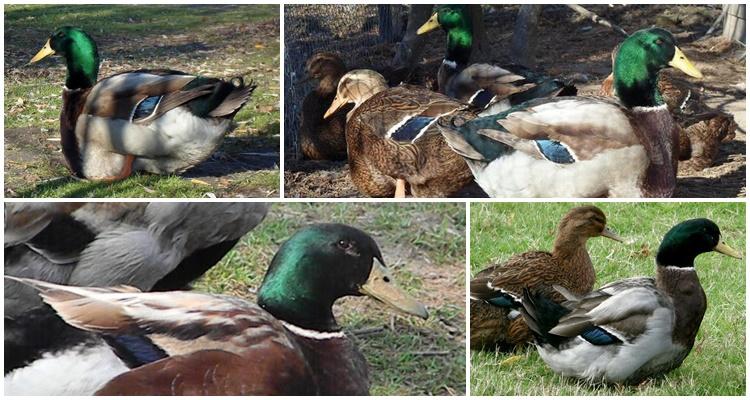

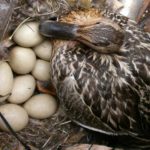
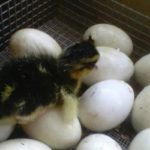
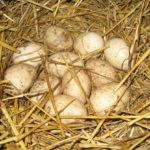

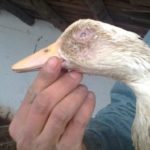



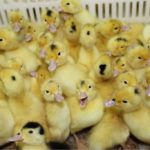

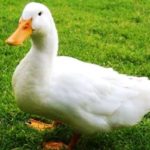


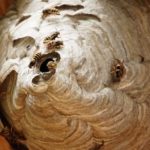

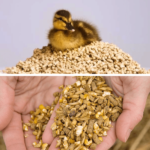
A wild duck laid eggs on my property, so now I’m reading
In the summer, a duck always flies to our site, but she laid her eggs on the pond. And this year, right today, she brought us 9 ducklings. We don't know what to do. He walks around the site with them and swims in our artificial puddle pond. What to do?
Your attitude to the problem is not entirely clear. Is the duck bothering you? Or do you want to create more comfortable living conditions for her? Animals and birds choose their “place of residence”, guided by their own attitudes. Possible options:
1. Bury the pond.
2. Destroy the duck.
3. Leave everything as is.
But the best thing to do is just not to disturb the duck. Let him live. And rejoice that you are so lucky. Wild ducks do not often approach humans. This means there is something special about your pond.
I found 4 duck eggs under my window. A wild duck has taken a fancy to this place, flies in and adds eggs every day! It’s very interesting to watch how she hides her eggs as she flies away! We are waiting for ducklings, although we don’t know when she will hatch them.
We are waiting for ducklings, although we don’t know when she will hatch them.  I've already seen 10 eggs! We are worried that the cat will not harm
I've already seen 10 eggs! We are worried that the cat will not harm 
We are also puzzled by the fact that the road is close. Need to fence?
Well, since the duck chose its “place of residence” itself, solving your problem is not so easy. You, of course, can build her some kind of nest or fence. But will she live there? At any moment the duck can “change his mind.” And move somewhere else. As for protection from a cat, everything is even more complicated here. Cats are predators. Ideally, you need to completely isolate your tailed friend. But this is hardly possible. Just watch the situation. If necessary, intervene.